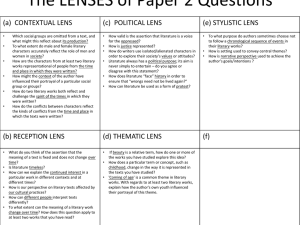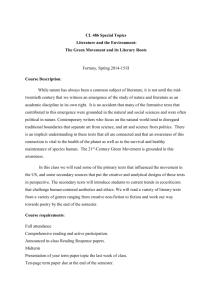DRAFT Pacing Guide for English 12b Overview: The foci of this
advertisement
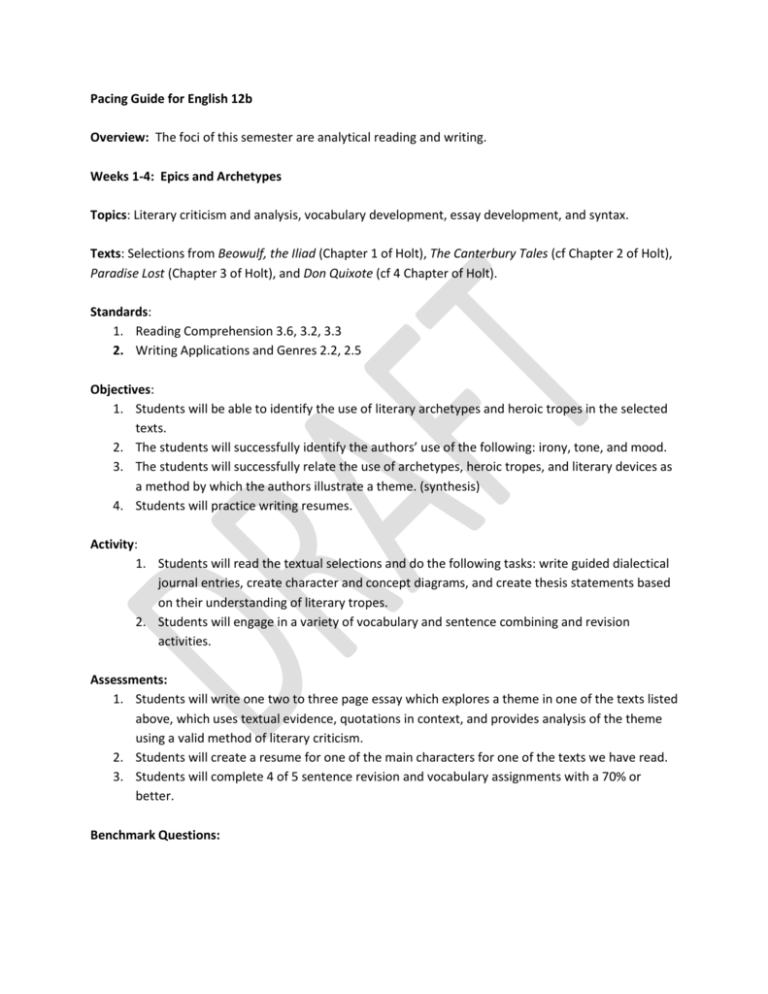
Pacing Guide for English 12b Overview: The foci of this semester are analytical reading and writing. Weeks 1-4: Epics and Archetypes Topics: Literary criticism and analysis, vocabulary development, essay development, and syntax. Texts: Selections from Beowulf, the Iliad (Chapter 1 of Holt), The Canterbury Tales (cf Chapter 2 of Holt), Paradise Lost (Chapter 3 of Holt), and Don Quixote (cf 4 Chapter of Holt). Standards: 1. Reading Comprehension 3.6, 3.2, 3.3 2. Writing Applications and Genres 2.2, 2.5 Objectives: 1. Students will be able to identify the use of literary archetypes and heroic tropes in the selected texts. 2. The students will successfully identify the authors’ use of the following: irony, tone, and mood. 3. The students will successfully relate the use of archetypes, heroic tropes, and literary devices as a method by which the authors illustrate a theme. (synthesis) 4. Students will practice writing resumes. Activity: 1. Students will read the textual selections and do the following tasks: write guided dialectical journal entries, create character and concept diagrams, and create thesis statements based on their understanding of literary tropes. 2. Students will engage in a variety of vocabulary and sentence combining and revision activities. Assessments: 1. Students will write one two to three page essay which explores a theme in one of the texts listed above, which uses textual evidence, quotations in context, and provides analysis of the theme using a valid method of literary criticism. 2. Students will create a resume for one of the main characters for one of the texts we have read. 3. Students will complete 4 of 5 sentence revision and vocabulary assignments with a 70% or better. Benchmark Questions: Weeks 5-8: The Conscience of the Individual Texts: Hamlet, A Modest Proposal Standards: 1. Reading Comprehension 3.6, 3.2, 3.3 2. Writing Applications and Genres 2.2 Objectives: 1. Students will be able to analyze how the theme of the crisis of conscience is developed in Hamlet and successfully write a response to literature which explores that theme in relationship to the Shakespeare’s use of tone, mood, and other relevant literary devices. 2. The students will successfully identify the use of irony and tone in A Modest Proposal and how it makes the text a social commentary, rather than simply an attempt at humor. Activity: 1. Students will read the texts and do the following tasks: write guided dialectical journal entries, create character and concept diagrams, and create thesis statements based on their understanding of literary citicism. 2. Students will engage in a variety of vocabulary and sentence combining and revision activities. Assessments: 1. Students will write one two to three page essay which explores a theme in one of the texts listed above, which uses textual evidence, quotations in context, and provides analysis of the theme using a valid method of literary criticism. 2. Students will complete 4 of 5 sentence revision and vocabulary assignments with a 70% or better. Weeks 9-11: Reactions to Modern Life Topics Texts: Brave New World (ORB); selections from Island of Dr. Moreau, and Frankenstein. Activity: 1. Students will read the textual selections and do the following tasks: write guided dialectical journal entries, create character and concept diagrams, and create thesis statements based on their understanding of literary tropes. 2. Students will engage in a variety of vocabulary and sentence combining and revision activities. Standards: 1. Reading Comprehension 3.1, 3.2, 3.3, 3.3 2. Writing Applications and Genres 2.2 Objectives: 1. Students will be able to identify the use of satire and allegory in the selected texts. 2. The students will successfully identify the following themes in the selected texts: the hubris of science without philosophy, man vs. nature, and the dystopian visions of the present or future as a reaction to industrial and/or social change. Assessments: 1. Students will write a three to five page essay which explores one of the themes listed above, which uses textual evidence, quotations in context, and provides analysis of the evidence using a valid literary criticism approach (i.e. Deconstruction, Social , Feminist) (1 Credit) 2. Students will turn in a Dialectical Journal that has a minimum of 40 quotations and responses in them which explores the themes described above and/or identifies the literary devices described in the objectives. (1 IS Credit) 3. Students will complete 4 of 5 sentence revision and vocabulary assignments with a 70% or better. Benchmark Questions:



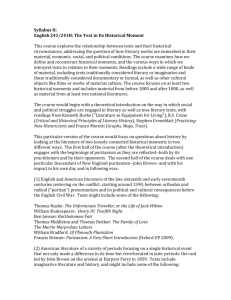
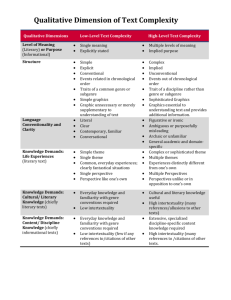
![Literature Option [doc] - Department of French and Italian](http://s3.studylib.net/store/data/006916848_1-f8194c2266edb737cddebfb8fa0250f1-300x300.png)
